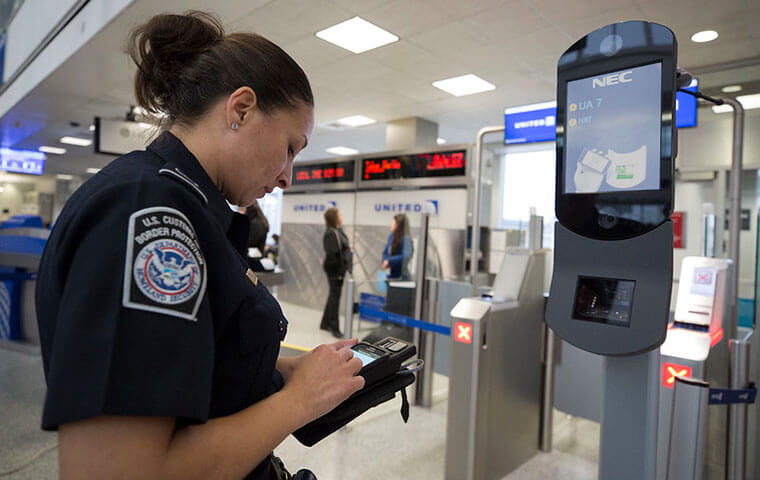 CBP, Office of Field Operations, officers take biometric photos of passengers prior to boarding a flight at Houston International Airport on February 12, 2018. Seen here a CBP officer sets up the biometric equipment prior to boarding time. Image: CBP, Donna Burton
By: FEDweek Staff
CBP, Office of Field Operations, officers take biometric photos of passengers prior to boarding a flight at Houston International Airport on February 12, 2018. Seen here a CBP officer sets up the biometric equipment prior to boarding time. Image: CBP, Donna Burton
By: FEDweek StaffGAO has called on federal law enforcement agencies to put stricter privacy and other controls on their use of facial recognition technology and to better train their employees on its use.
A report said that law enforcement components of Justice and DHS have used such technology from commercial and nonprofit entities since at least 2018 to support criminal investigations but that all seven it reviewed “initially used these services without requiring staff take facial recognition training.”
Homeland Security Investigations began training requirements in 2021 and the U.S. Marshals Service earlier this year, while for example the FBI “has only recommended it as a best practice” as a practical matter, despite internal policy that certain employees must be trained. Of about 200 FBI employees who accessed the service, only 10 had received the training, it said.
“The use of facial recognition technology for criminal investigations presents unique questions about civil rights and civil liberties. For example, civil liberties advocates have noted that the use of facial recognition at certain events—such as protests—could have a chilling effect on individuals’ exercise of their First Amendment rights. Additionally, facial recognition technology, like all artificial intelligence (AI) technology, contains the potential for error and thus the potential to misidentify individuals,” the GAO said.
Of the seven, three—HSI, the Marshals Service, and the Secret Service–have policies that address civil rights and civil liberties. “DHS has plans to finalize a department-wide policy by December 2023. DOJ has taken steps to issue a department-wide policy, but has faced delays,” the report said.
GAO noted a 2022 executive order requiring a study of privacy, civil rights, and civil liberties concerns from facial recognition technology and requiring an interagency effort to identify best practices. However, it said that some efforts required by the order have been delayed for funding and other reasons.
It said the agencies agreed with its recommendations determine the extent to which they use the technology; set and enforce training requirements; and review their policies and revise them to address privacy and other issues.
Key Bills Advancing, but No Path to Avoid Shutdown Apparent
TSP Adds Detail to Upcoming Roth Conversion Feature
White House to Issue Rules on RIF, Disciplinary Policy Changes
DoD Announces Civilian Volunteer Detail in Support of Immigration Enforcement
See also,
How Do Age and Years of Service Impact My Federal Retirement
The Best Ages for Federal Employees to Retire
How to Challenge a Federal Reduction in Force (RIF) in 2025
Should I be Shooting for a $1M TSP Balance? Depends…

